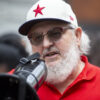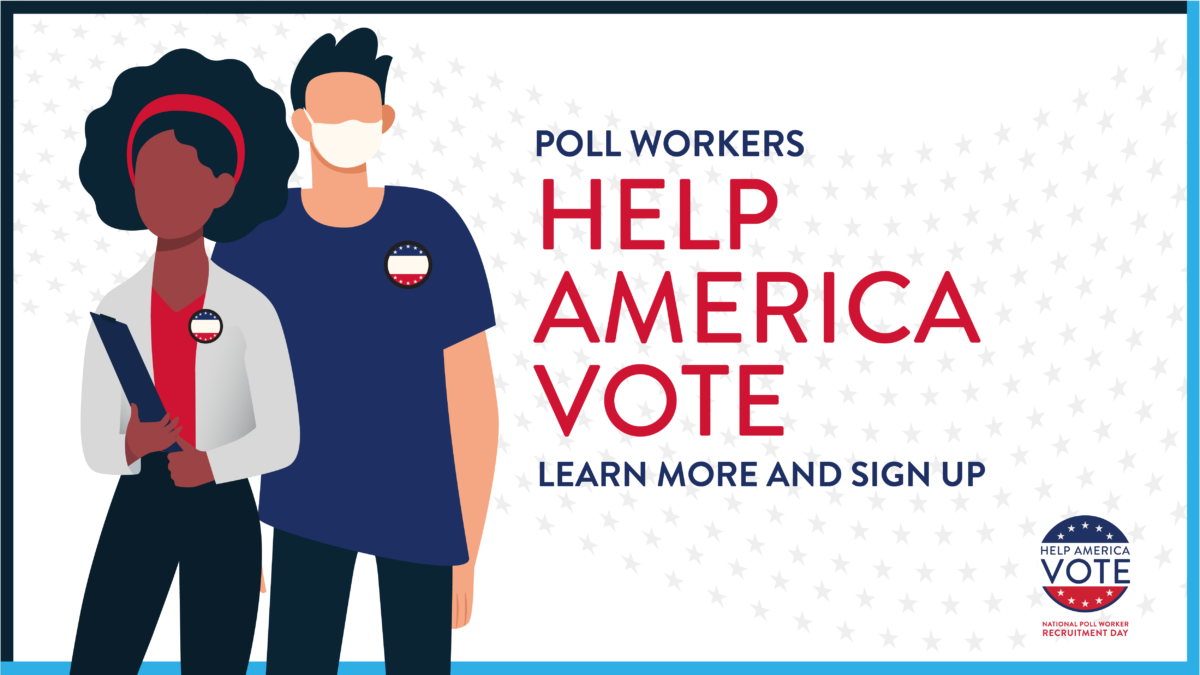With a burst of civic pride, patriotism or that feeling of never again wanting to see people attacking our democracy, I answered a call from local government for poll workers. I had never done anything like it before, but how hard could it be?
I went through the advance online training without a problem, although the complexity of setting up the voting equipment and preparing the dozens of envelopes and required reports was surprising. The guidebook for tasks and duties turned out to be 64 pages of how-tos and do’s and don’ts.
When the day — this past Tuesday, Election Day — arrived, the reality of waking up at 5 a.m. to head into a completely strange environment for a 14-hour shift seemed surreal. Was it too late to call off?
Still, I made the short drive to the Mount Assisi Convent, a polling place for voters in Ross and Bellevue, and trudged into the former church basement, which turned out to be a basketball court with a stage at the far end for pre-school activities. I walked over to a middle-aged woman standing alone at the far end of the gym, who told me it was her first time working the polls also and that she was not sure where we were to begin.
Three other women scampered around the white folding tables. I asked one, who turned out to be the judge of elections, what I could do to help set up. She handed me a set of instructions and told me to set up the Americans with Disabilities Act voting machine that was sealed in a black traveling case, and then she continued what she was doing.
So much for starting slow.
Determined to stand up for my democracy, I completed the task and dived into others including unsealing bundles of forms, setting up tables, positioning voter privacy shields, and setting up the check-in area where people received their ballots, pens and “I Voted” stickers.
We were sworn in, and I became an official part of an election board of five for Ross: One judge of elections, two inspectors (majority and minority), and two clerks (majority and minority). (Another board handled voters from Bellevue.) I was proud to find that I was majority clerk. I am still not sure what that meant, but I was part of a team that worked from 7 a.m. through 8 p.m. to make the election happen.
Here are my main takeaways.
My compatriots, all female, represent a cross-section of the North Side community. My fellow newbie teaches psychology classes and runs a program for disadvantaged people. She has a Ph.D. and has done research at Yale University. She married “late in life” to an English gentleman from Kent.
The judge of elections has been doing this for more than 10 years and keeps saying she will retire someday soon. Another worker, who has been working at this the longest, seems to know everyone and knows which district people belong to just by hearing their street addresses. (You can tell a lifer by their demeanor.)
My final teammate, I learned, is exactly my age and was quite helpful in quick explanations of the process.
By the time the night was over, I would count all of them as friends.
The most rewarding part of the experience was the interaction with the voters.
Many families voted together. A mother and daughter came up to the check-in and shared stories of their day together. Husbands and wives were quick to share a joke about each other and say why they feel voting is so important. You could tell they are proud of voting and of doing it together for so long.
My community teammate told a story of a woman she has helped to vote for years, who, when asked where her husband was, responded that he had died the day before. The woman said she felt compelled to come to vote anyway because they both held the right to be so necessary. In fact, the couple had recently spent an evening, over tea, discussing who they were going to vote for and why. My teammate and the woman ended up crying together at the table.
A father whose last name I found in the roll book said, “That is me there. And that is my son’s name there.” When he left the table, he promised he would be back. He did come back later with his son in tow. As his son signed the book, the dad, with a proud smile, snapped a photograph with his phone. My judge of elections reminded me no photos are allowed, but the moment was worth it.
Some parents brought children with them and the “I voted” stickers were very popular with the kids. Some of them made a promise to vote when they were old enough, and I liked that.
Many of the 160 voters that we processed over the day thanked us for volunteering to make it possible for them to cast their ballots. In all, with mail-in votes, 240 people cast ballots in the precinct. I was told that was above average for a local election.
What I learned from the process of working for the polls was how much it is about making sure that anyone who wants to vote can vote. Whether it is a simple sign-in, or a provisional ballot, or finding a way to work out any roadblock, poll workers take the time to get it done. I never realized how much work goes into that.
The other key is to make sure all ballots are cared for and that everything in the process is recorded and secured. I found that each of my teammates were invested in that. To tell the truth, we never discussed the actual candidates during the day. Our focus was on the voters and their ability to cast their ballots — the foundation of our democracy.
My final thoughts on my day working the polls?
Get back to me after the spring primary election.
For information about working the polls, visit https://www.eac.gov/help-america-vote.

Joe Knupsky
Joe is a copy editor at the Pittsburgh Post-Gazette, but he's currently on strike. Email him at jknupsky@gmail.com.


